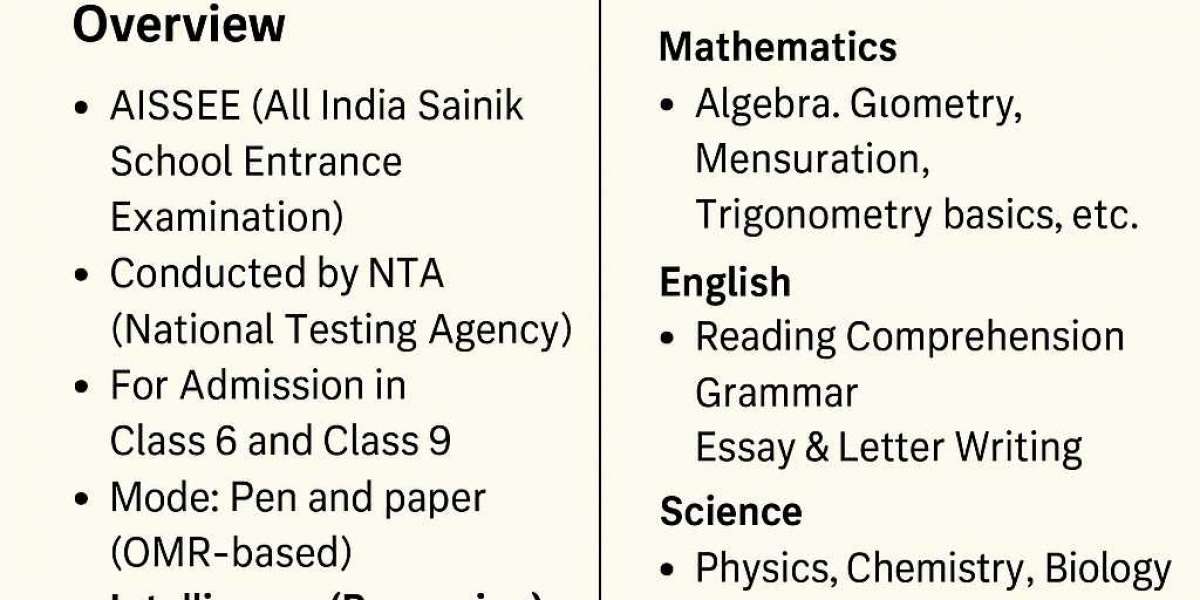The Sainik School entrance exam, officially known as the All India Sainik School Entrance Examination (AISSEE), is a gateway for students to join prestigious Sainik Schools across India. Conducted by the National Testing Agency (NTA), this exam opens the door for admission into Class 6 and Class 9.
Understanding the Sainik School syllabus is the first step toward effective preparation. It provides clarity on what to study and how to manage time across subjects. In this blog, we break down the entire syllabus, exam pattern, and preparation strategies for AISSEE 2025.
Sainik School Entrance Exam Overview
Before diving into the syllabus, let’s look at a quick overview of the AISSEE:
- Exam Name: AISSEE (All India Sainik School Entrance Exam)
- Conducted By: National Testing Agency (NTA)
- For Admission in: Class 6 and Class 9
- Medium of Exam: English, Hindi, and regional languages (Class 6), English only (Class 9)
- Exam Type: Pen and paper (OMR-based)
- Question Type: Multiple Choice Questions (MCQs)
Sainik School Syllabus for Class 6
a. Mathematics
Math carries the highest weightage in the Class 6 AISSEE. Key topics include:
- Number System
- Fractions and Decimals
- Profit and Loss
- Geometry (shapes, symmetry)
- Time, Distance, and Speed
- Measurement (length, weight, capacity)
- Simple and Compound Interest
- Ratio and Proportion
- LCM HCF
- Area and Perimeter
b. English
The English section tests grammar, vocabulary, and comprehension:
- Synonyms and Antonyms
- Comprehension Passages
- Sentence Formation
- Fill in the Blanks
- Tenses
- Prepositions
- Articles
- Jumbled Sentences
- Singular/Plural
- Correct Usage of Words
c. General Knowledge
GK evaluates awareness of the world around:
- India and its Neighbours
- Monuments, Festivals, Rivers
- Sports and Games
- Famous Personalities
- Basic Science Facts
- Current Affairs
- Books and Authors
d. Intelligence (Reasoning)
Covers both verbal and non-verbal reasoning:
- Pattern Completion
- Series
- Odd One Out
- Classification
- Coding-Decoding
- Analogy
- Mirror and Water Images
Sainik School Syllabus for Class 9
a. Mathematics
Advanced math topics as per Class 8 NCERT level:
- Algebraic Expressions
- Linear Equations
- Mensuration
- Rational Numbers
- Geometry – Circles, Quadrilaterals
- Square Roots
- Data Handling
- Trigonometry (basic)
- Graphs and Charts
b. English
More emphasis on comprehension and writing:
- Reading Comprehension
- Grammar Rules
- Essay Writing
- Letter Writing
- Vocabulary Usage
- Active Passive Voice
- Direct Indirect Speech
c. Science
Based on Class 8 Science curriculum:
- Light and Sound
- Force and Pressure
- Combustion and Flame
- Crop Production
- Reproduction in Animals
- Cell Structure and Functions
- Chemical Reactions
- Pollution
d. Social Science
Aligned with NCERT Class 8 syllabus:
- Indian Constitution
- Freedom Struggle
- Natural Resources
- Agriculture
- Climate and Vegetation
- Democracy
- Judiciary
- Geography of India
e. Intelligence (Reasoning)
Covers analytical and logical reasoning:
- Verbal and Non-Verbal Series
- Classification
- Number Series
- Logical Deductions
- Direction Sense
- Alphabetical Series
Exam Pattern: Class 6 vs Class 9
Section | Class 6 | Class 9 |
Mathematics | 50 Questions – 150 Marks | 50 Questions – 200 Marks |
Intelligence | 25 Questions – 50 Marks | 25 Questions – 50 Marks |
GK | 25 Questions – 50 Marks | 25 Questions – 50 Marks |
Language | 25 Questions – 50 Marks | 25 Questions – 50 Marks |
Science | Not Applicable | 25 Questions – 50 Marks |
Social Science | Not Applicable | 25 Questions – 50 Marks |
Total Marks | 300 Marks | 400 Marks |
Duration: 150 minutes (Class 6) | 180 minutes (Class 9)
Changes in Syllabus or Pattern (If Any)
The syllabus and exam pattern remain largely unchanged for AISSEE 2025. However, it’s always advised to visit the official NTA website for any recent updates or changes in pattern or marking scheme.
Preparation Tips Based on the Syllabus
- Understand the syllabus first: Make a topic-wise checklist.
- Set a timetable: Allocate more time to math and reasoning.
- Use NCERT Books: Especially for Class 9 (Math, Science, SST).
- Solve previous year papers: They help identify question trends.
- Take mock tests regularly to track progress.
- Revise regularly: Don’t wait till the last month to revise topics.
Why Coaching Helps in Covering the Syllabus Effectively
Self-study is good, but coaching offers a structured approach:
- Expert guidance and doubt-solving
- Mock tests and analysis to understand strengths and weaknesses
- Discipline and routine through regular classes
- Study materials and notes aligned with the latest syllabus
At Sukhoi Academy, we offer both online and offline coaching for AISSEE with full syllabus coverage, personalized mentoring, and hostel facilities for boarding students.
Conclusion
The Sainik School syllabus for Class 6 and Class 9 provides a roadmap for focused preparation. It covers subjects like Mathematics, English, GK, Science, and Reasoning. Starting early and following the syllabus properly can give students a big advantage.
FAQs Related to Sainik School Syllabus
Q1. Is the syllabus the same for all Sainik Schools?
Yes, the AISSEE syllabus is the same for all Sainik Schools across India.
Q2. Is NCERT enough for Class 9 preparation?
Yes, NCERT books for Class 8 are ideal for Class 9 entrance prep.
Q3. Which books are best for AISSEE preparation?
NCERT books, Arihant, and Sukhoi Academy’s course materials.
Q4. How much time is needed to complete the syllabus?
With proper planning, 4–6 months of focused study is sufficient.
Q5. Is there any negative marking in AISSEE?
No, as per the latest pattern, there's no negative marking.




